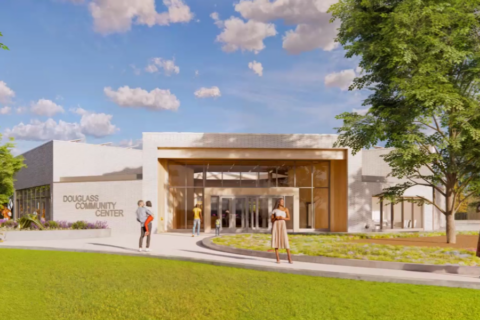Health officials in D.C. are hopeful a monkeypox outbreak in the District can be contained before it spreads into the wider population but say they need more vaccine doses from the federal government — and the public’s help.
“Monkeypox is still something that we can prevent,” said Patrick Ashley, senior deputy director for the Health Emergency Preparedness and Response Administration, with DC Health, speaking on WTOP’s daily podcast DMV Download, hosted by Megan Cloherty and Luke Garrett.
“It’s still something that we can address, and we want people to get vaccinated,” he said.
Ashley said D.C. needs more monkeypox vaccine doses, which are supplied by the federal government.
“But we also want people to be cognizant of signs and symptoms that they’re seeing on their bodies,” he said, saying monkeypox can look like a pimple or an ingrown hair.
He added: “We’re very fortunate that we’re not seeing cases explode, like we saw with COVID. But we need the public’s help to … understand that this spreads through close contact, and to be aware of how it spreads, and also to educate their friends and their neighbors.”
Overall, D.C. has recorded 179 monkeypox cases. That marks D.C. as one of the hardest-hit jurisdictions per capita. There have been about 3,500 monkeypox cases reported in the U.S., according to the Centers for Disease Control and Prevention.
The majority of cases in D.C. have been in gay or bisexual men. For now, eligibility for the monkeypox vaccine in D.C. is limited to the most at-risk population, which includes that group, as well as transgender women who have sex with men, and sex workers.
DC Health is encouraging residents in those groups to register online to be contacted when vaccine appointments are available.
So far, D.C. has received about 14,000 vaccine doses, and it anticipates needing a total of about 100,000 doses to cover the entire eligible population in D.C. The vaccine is a two-dose regimen.
Earlier this week, D.C. officials announced they were shifting strategy, temporarily postponing second doses to cover more people with a first dose.
“The data shows that the vaccine provides effectiveness for up to six months or longer if we make it a one-dose product,” Ashley said.
He added, “When we talk about containing a virus, we’re really looking at … how do we get our arms around it as quickly as possible. And so having more people vaccinated allows us to slow the spread down even faster.”
Ashley said eligibility for the vaccine won’t necessarily broaden once supplies increase.
“The reality is that I hope it doesn’t have to expand … We don’t want to see a world in which everyone needs this. And so that’s why the quicker we can get individuals vaccinated to contain this outbreak, the less likelihood we’ll have to expand that.”
Ashley said, as a gay man himself, he is sensitive about monkeypox being stigmatized as a “gay disease.” At the same time, he said, health officials want to communicate directly with the population most at risk.
“The reality is, this is a very touchy topic. We want to get education out to the population that’s being affected the most and we want those individuals to take precautions … we’ve got to balance that messaging very carefully.”
Earlier this week, D.C. health officials announced an infant passing through D.C. with family had tested positive for monkeypox, becoming one of the first children in the U.S. to test positive for the virus.
The virus can be spread through skin-to-skin contact and respiratory droplets, such as through kissing, Ashley said.
“It’s not an STD, because you can be touching someone in other ways that are not sexual and transmit the disease,” Ashley said. “And that’s what we think happened with this baby — that it was some sort of other contact. … Some other person that was probably holding and loving on that baby, who had a sore and was just not that aware of what was going on.”
That demonstrates the importance of knowing your body and being aware of any changes.
“Even [if] it’s a pimple or an ingrown hair,” he said. “We see that sometimes monkeypox presents that way. And we want people to be very aware of that, and talk to their physician about getting tested.”
D.C. health officials are talking every day with their counterparts in Maryland and Virginia about what They’re seeing, he said.
“Just like COVID, when we detect new variants, we’re seeing different presentations of monkeypox,” Ashley said. “And so we’re constantly comparing notes to say: ‘This person presented with a rash that looks like this. And we’ve never seen this before in monkeypox.'”







